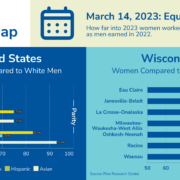After #MeToo, Eyes Are Open
Banks should evaluate, update harassment policies and procedures to protect all employees, customers
While the #MeToo movement has thus far led to only "a slight increase" in harassment reports within the financial services industry, according to Jennifer Mirus, co-chairperson of the Labor and Employment Law Group at Boardman & Clark, LLP, it has heightened awareness of harassment in the workplace. "More people are aware of their rights and willing to come forward."
"Eyes are open, people are watching and waiting to see what management will do about bullying and harassing behavior," said Julia Johnson, senior manager at Wipfli LLP. "When management chooses to do nothing, that's when the bank becomes vulnerable to claims of discrimination."
Johnson has observed "an increase in sensitivity to bullying, disrespectful, and/or harassing behaviors." Behavior that "may have been overlooked or brushed aside in the past is being brought into the light of day."
The #MeToo movement is about societal workplace environments and not bringing "forth these issues out of fear of retaliation," Mirus noted. There's been "a long-term tide … that is turning to demonstrate that this behavior will not be tolerated."
While the laws specifically addressing harassment remain generally unchanged, new measures have nevertheless aimed at this unacceptable behavior. The new tax law, for instance, "states that any settlement, payout or lawyer's fees related to sexual harassment or sexual abuse cannot be deducted as a business expense if such payments were subject to a nondisclosure agreement," Mirus said. The law supports the idea, "that these settlements—and the harassers behind them—should no longer be protected by confidentiality."
Mirus added that the new generation of workers is less tolerant of harassing behavior, and this cultural change is being reflected in court decisions. "We are seeing a broadening of the groups of individuals legally protected from harassment, and a more aggressive stance on behaviors that will be deemed illegal harassment." Core protected classes now include disability, race, sexual orientation, gender, age, religious belief, national origin, and ancestry, among others. Still, laws vary by region; the City of Madison lists a total of 26 protected categories, including, for instance, credit history and political beliefs.
A financial institution's harassment policy "needs to prohibit discrimination and should mention the core classes of individuals protected from harassment, including 'any other classification protected by law'," Mirus said. "Policies also need to be clear that harassment is prohibited between employees, between management and employees, and between third parties and employees." If a customer harasses a teller, the bank has a legal obligation to address concerns and follow its policy on this issue.
The "policy should include an adequate recording mechanism," Mirus said. An individual who experiences-or witnesses-harassment should have more than one channel to report their concern. "A policy should not state that the individual experiencing the harassment must first report it to their boss, nor should it require the employee to confront the harasser," she said. Confronting the harasser is "a burden the law does not allow you to place on the person being harassed." A policy can state that if individuals feel comfortable about confronting the harasser, they may do so, but they may also go to HR or another resource.
A policy should prohibit retaliation. "This is where a significant amount of litigation is occurring," according to Mirus. Retaliation might come in the form of a denied promotion, hostile treatment, or something as simple as a lack of response to requests for work-related information. Whatever its form, the policy should provide a path forward to report retaliatory behavior.
Johnson outlined key components of harassment policies in addition to prohibiting retaliation:
- The financial institution's commitment to provide an environment of respect free from all forms of discrimination and harassment on the basis of a protected class.
- The definition of harassment and examples of behavior that may constitute harassment, including behaviors that occur on personal social media.
- An emphasis on the responsibility of all employees to create an atmosphere free from discrimination and harassment.
- A reporting process for individuals who have experienced or witnessed harassment, providing at least two people of different genders with whom individuals can share their experience.
- A statement that reported incidents of harassment will be investigated with respect for the sensitivities of the situation, but without guaranteeing that a complaint will remain strictly confidential.
Training managers to address harassment is best done in person, Johnson advised. "Face-to-face training enables the trainer to engage managers in the discussion. Role-playing various scenarios can be a very effective way for people to gain confidence when faced with those uncomfortable conversations with employees."
Mirus noted that managers have a legal duty to address harassment. "That is often where the ball gets dropped." An employee may mention to a manager that an individual is making comments on the employee's clothes or other inappropriate remarks. "The comment doesn't seem like a big deal and the manager doesn't do anything," she said, "but the manager has a legal obligation to report [the behavior]" and ensure that proper steps are taken to prohibit it. "If the manager knows about the harassing behavior, the bank knows."
Training for managers should emphasize that "they may not engage in harassing behavior and they must be role models," Mirus said. In addition, "there are heightened requirements that they report and follow through on complaints."
If a financial institution is sued, "one of the first questions an investigator will ask is 'what kind of training have you provided?'" Mirus said. "If you cannot provide documentation that you have provided meaningful training, you're really behind the eight ball in defending against harassment claims."
When there is a complaint of harassment, "it's very important that it gets handled appropriately and swiftly," she added. If a manager takes no immediate action, the employee may perceive that the organization will not effectively address the concern.
"Training demonstrates that the organization is committed to addressing these issues and having a workplace that is comfortable for everyone," Mirus said. It can take place in briefings, monthly meetings, or other ways, but it "must come from the top," she said. "If key players or leadership are [permitted] to engage in inappropriate conduct, there will be no authentic sense among employees that these behaviors will be dealt with appropriately."
Johnson agreed: "If there is a history of tolerance of bad behavior by select individuals because they are one of 'the untouchables,' then that hill is a steep climb. In these cases, formal training can be key to laying the foundation for behavioral expectations moving forward," she said. "It is a significant risk to the bank to let harassing behavior go unchecked. The risks can be significant: reputational risk, reduced morale, reduced productivity, turnover, and of course, litigation."
Most harassment in unintended, Johnson said. "Unintentional harassers believe they are joking around and having fun—when in fact, others aren't enjoying that sense of humor." Sometimes just calling their attention to how their behavior is perceived will cause a behavioral shift. Individuals who are not receptive to changing their behavior pose the greatest risk to the bank. "If an individual continues to engage in unacceptable behaviors and is unwilling to change, termination is often the only solution."
On the plus side, "a financial institution that is living its values and advancing a culture that encourages others … has likely established trust, and the lines of communication are open," Johnson said. "In this situation, there is the opportunity to reaffirm those values and expectations for respectful behavior in the workplace."
Ann Lueth, senior vice president and human resource director at First Bank Financial Centre, Oconomowoc, can attest to Johnson's words. All new FBFC employees attend an orientation that includes a discussion on harassment. Common sense is emphasized. "If it's not something you would do or say in front of the president and CEO, it's not something you should do with anyone." FBFC also provides online training and a combination of online and in-person leadership training for managers.
President and CEO Mark W. Mohr spends 30 minutes at every new employee orientation, Lueth reported. In 10 years he has never missed a monthly orientation.
"Starting with the modeling of behavior is critical, stemming through the president and CEO," Lueth said. "You get a feeling for what the culture is … Maybe you have an idea, or a suggestion, or a question. There's openness for information or answers."
Lueth frequently visits branch offices and meets with branch managers. "I work hard to make myself available and approachable," she said. "In all employee trainings, I emphasize we have a zero tolerance for harassment, including harassment from a customer or a vendor."
It's no accident that FBFC has been recognized as a top midsize employer by the Milwaukee Journal Sentinel for eight consecutive years, Lueth said. "Our employees feel the support."
Green is a freelance writer for the Wisconsin Bankers Association.
Boardman & Clark, LLP is a WBA Gold Associate Member.
Wipfli LLP is a WBA Silver Associate Member
By, Amber Seitz



